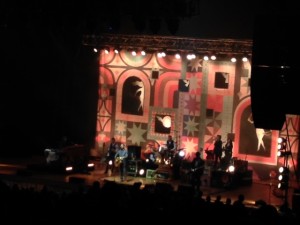 The folk based rock of the Portland, Ore., band The Decemberists is probably best suited for theaters — ramshackle ones with patched curtains and vaudeville ads sewn on them, with flickering faltering footlights to illuminate their wistful songs and often costumed ballads of weird whimsey and shambling shanties.
The folk based rock of the Portland, Ore., band The Decemberists is probably best suited for theaters — ramshackle ones with patched curtains and vaudeville ads sewn on them, with flickering faltering footlights to illuminate their wistful songs and often costumed ballads of weird whimsey and shambling shanties.
By now, though, their tours demand bigger stages. And on a rainy Thursday, they projected way up the muddy hill at Merriweather Post Pavilion in Columbia, Md., where, at least under the roof of the amphitheater, their songs had a sunnier home.
What lifted the show was the wealth of material from “What a Terrible World, What A Beautiful World,” their fine album from earlier this year, filled with solid individual songs rather than the overarching (and sometimes overbearing) thematic works of earlier albums.
The Decemberists is largely Colin Meloy, his reedy voice and his evocative, often storytelling lyrics. So it’s fitting he began their long set alone with guitar doing the tongue in cheek opener from the new album, “The Singer Addresses His Audience,” which has some funny lines that the adoring crowd didn’t really laugh at.
(Either they knew the joke or were actually the kind of people who “cut your hair in the style that our drummer wore in the video”).
The band joined in one by one as the song went on, and soon the full complement of five, augmented by two harmonizing singers, were on stage. It’s quite an able group, though they didn’t much get the spotlight, from Jenny Conlee on keyboards and accordion to Chris Funk on an assortment of stringed instruments (but usually electric guitar). And hey those backup singers were no slouches either — that was by god Kelly Hogan and Nora O’Connor of Bloodshot Records fame.
But it was all Meloy’s show, sticking wisely to the largely upbeat things on the new album, from “Calvary Captain” and “Make You Better” to “Carolina Low” and “A Beginning Song,” ending the main set with its weight of irony just as it ends the album.
The show was structured such that it couldn’t take any alterations. Though the large crowd lumbered to its feet at one point, he took note but informed them the next song would be a ballad anyway. They were up again soon enough with a show that kept things upbeat despite the largely acoustic instrumentation.
The show benefitted from blowing up the beautiful quilt-like album design by Carson Ellis that not just took on different coloration due to lighting, but had 3-D depth for frames of its various figures, cupids and globes.
And yet there was nothing to stop from the mid-slow sludge of their stab at progressive rock from their recording low point, “The Hazards of Love,” which went from Conlee’s keyboard stylings from the Rick Wakeman playbook to the thudding underscored anthems that threatened toward Jethro Tull winning the metal Grammy territory. In fact, if “The Wanting Comes in Waves/Repaid” led directly to “Aqualung” instead of “The Rake’s Song,” at least they would have been honest about it.
It’s tough to get grumpy amid such bright colors and major keys, but Meloy was doing one of those power-drunk arena rock things, getting people to clap along to patterns on songs, pitting one side against the other for no particular reason.
Everybody loved doing that kind of thing though, and singing along too. And when the crowd all went back and forth like whitecaps in the ocean to the encore finale of “The Mariner’s Revenge Song,” it was almost like a They Might Be Giants show in terms of goofy crowd participation reverence. And though their new songs had risen above the need for such things, that beloved tale ended with the big whale coming in to chomp everyone up.
It was a great show, though, especially compared to opener Father John Misty, who came out in vaguely Jim Morrison garb — dark beard and long hair, a white shirt cut down the chest, with sunglasses hanging on the V (despite the all day darkness and rain).
The former drummer for Fleet Foxes stopped short of Morrison like bellowing, though, on songs that veered from the kind of harmonies of his former band into harder rock stridency. He joked a little, sang from a prone position on the stage and hid his band in the shadows even more than Meloy did.
Any of his success came from stagecraft: A big light up heart with the message: “No Photography.” Saying so, in red rope lighting yet, only guaranteed people capture the moment on their camera phone and post it.
Here’s an interview I did with The Decemberists guitarist Chris Funk for The Washington Post.